Stephen D. Morrison's Blog, page 18
June 24, 2014
Who Killed Jesus?
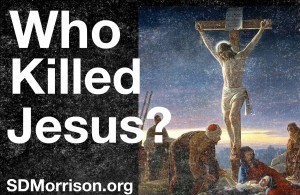 Jesus was not murdered. He offered up His life freely for the sake of humanity. No one took His life, He gave it away. 1 But the question remains, even if Jesus did offer up His life, to whom did He offer it up to? Who actually killed Jesus?
Jesus was not murdered. He offered up His life freely for the sake of humanity. No one took His life, He gave it away. 1 But the question remains, even if Jesus did offer up His life, to whom did He offer it up to? Who actually killed Jesus?
The Atonement, that is, the death of Christ, is something I’ve written on a few times before. 2 In my upcoming book I’ve chosen to spend a lot of time on this subject. 3 Today I thought it’d be fun to look at an aspect of the atonement that is often overlooked (or not taken seriously enough).
Within the classical understanding of Penal Substitutionary Atonement 4, the answer is God. God killed Jesus. Within this model Jesus offers up His life for the appeasement of His Father’s anger. But as I’ve written before, this understanding of the cross is highly problematic. It over legalizes this Gospel, undermines the unity of the Trinity, and paints a horrific picture of the Father.
Additionally, it blatantly ignores the bible.
Many who defend the classical doctrine of PSA will point to the bible as its origin, but in my understanding of scripture I don’t see how that’s possible. While there may be a few verses that in some ways appear to present PSA as true, there are far more verses that destroy it entirely. Take for example, our basic question: who killed Jesus? Within the Penal model of atonement, where the Son is punished by the Father for our sake, the answer must be that God killed Jesus. But the bible never once says that this is the case. In fact, it says the opposite. The bible clearly tells us that someone else killed Jesus, and it was not His Father.
Consider the following:
“For you, brothers and sisters, became imitators of God’s churches in Judea, which are in Christ Jesus: You suffered from your own people the same things those churches suffered from the Jews who killed the Lord Jesus and the prophets and also drove us out.” 1 Thessalonians 2:14-15 NIV Emphasis mine.
“After Jesus finished saying all these things, he said to his followers, ‘You know that the day after tomorrow is Passover. On that day the Son of Man will be handed over to his enemies to be killed on a cross.’” Matthew 26:1-2 ERV Emphasis mine.
“And all the people answered, ‘His blood be on us and on our children!’” Matthew 27:25 ESV Emphasis mine.
“Men of Israel, hear these words: Jesus of Nazareth, a man attested to you by God with mighty works and wonders and signs that God did through him in your midst, as you yourselves know—this Jesus, delivered up according to the definite plan and foreknowledge of God, you crucified and killed by the hands of lawless men.” Acts 2:22-23 ESV Emphasis mine.
“let it be known to all of you and to all the people of Israel that by the name of Jesus Christ of Nazareth, whom you crucified, whom God raised from the dead—by him this man is standing before you well.” Acts 4:10 ESV Emphasis mine.
The cross was not divine child abuse. The Father did not beat up His Son so that He could love you. God gave up His life for the sake of the human race, at the hands of the human race. In a stunning display of self-sacrifical love, Jesus hung on the cross, crying out to those who had crucified Him: “Father forgive them, for they do not know what they are doing.” 5
What outrageous grace! What stunning love!
That is good news. Divine child abuse, is not good news. Jesus saves us from sin, not from His Father’s fury. Jesus gives His life for our life, not as a pagan appeasement sacrifice, but as a stunning display of unconditional grace. The cross was the beautiful act of love in which the man Jesus Christ died our death in order to undo death itself, thereby freeing us from sin. Who killed Jesus? Certainly not the Father.
Jesus died at the hands of man, to free man from the hands of sin.
What do you think? Can you find any scriptures that prove me wrong here? Comment below!
Like this article? Help me expand my reach by sharing:
Notes:
See John 10:18 ↩See On Atonement ↩Tentatively entitled We Belong: Trinitarian Good News - coming this fall ↩The view that Jesus was punished from the Father (penal) in our place (substitutionary) for the sake of our redemption, reconciliation and justification (atonement). ↩Luke 23:34 ↩June 22, 2014
Disowning Homosexual Children, A.K.A. How Not to Be a Good Parent
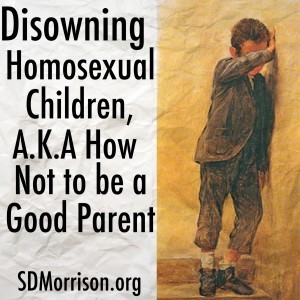 A very well known pastor, author, and theologian has come up with some “great” (hint: sarcasm) advice on what to do with your child if him or her comes out to you for practicing homosexuality. His advice? You must 1) alienate them, 2) refuse to eat with them, and 3) isolate them. 1
A very well known pastor, author, and theologian has come up with some “great” (hint: sarcasm) advice on what to do with your child if him or her comes out to you for practicing homosexuality. His advice? You must 1) alienate them, 2) refuse to eat with them, and 3) isolate them. 1
When I first heard about this I don’t know if I wanted to laugh or cry. Laugh, because of how ridiculously un-Christ-like this is, hoping it’s a joke; or cry, because of how sadly hatful this is, knowing that it is not a joke.
Since when has judgement ever changed anyones life? Since when has hatred ever solved any problem? (And don’t tell me this is not hatred, it may be masked as Christian love, but it’s coming off as plain old hatred to the poor child on the other end.)
I understand that this pastor is just trying to help, but seriously, what terrible advice. Conditional love is never in God’s heart for anyone.
Instead, here’s my advice. How about you just unconditionally love them? Walk up, give them a big hug, take them out for ice cream, and tell them that you will always love them no matter what (even when you disagree with them).
In doing that, you will show what God the Father is like. He does not abandon us in our shortcomings, nor does He isolate Himself from us when He disagrees with our theology! He loves us, and promises to never abandons us. If you’re a parent, love unconditionally. Because if you do, you will preach the Gospel! You will share the news that God loves the human race unconditionally.
The difference here is clear. It is between unconditional love and conditional love, or, in other words, between religion and grace.
Choose grace, choose unconditional love.
I think this principle applies to every area of the Christians life. Not just for parents, but for all of us. We should all learn what it means to love unconditionally indiscriminate of agreement, or disagreement. In doing so, we learn how to truly preach the Good News of Jesus’ wild love affair with the human race! He loves unconditionally, let us too learn how to love unconditionally.
So what do you think? How would you respond to this pastors remarks? Leave me a comment below!
Like this article? Help me expand my reach by sharing:
Notes:
Here’s the original clip, along with some great commentary. ↩June 19, 2014
Is America REALLY Free?

“Then you will know the truth, and the truth will set you free.” - Jesus in John 8:32
“When your city is built upon violence, freedom is just another word for killing your brother. But when your city is built upon love, freedom is just another word for being your brother’s keeper. Jesus brings us the truth that will set us free. The truth is that God is love and light. The truth is that our enemies are really our alienated brothers. The truth is there is no ‘them’—there is only us. The truth is that freedom is love, not power.” – Brian Zahnd in A Farewell to Mars
What is freedom? The American system is founded upon the notion of freedom, but what sort of freedom? And is this freedom the same sort of freedom that Jesus is talking about here in John 8? And what about this quote from Brian Zahnd, is it accurate? When freedom means carrying the bigger stick, is that truly freedom?
We say we are “free” in America, but what I think we mean really is that we are powerful enough to kill anyone who threatens our way of life. We have the biggest army, the most nuclear weapons, the best war tactics… which all begs the question: is this what makes us free?
I’ve just finished reading Brian Zahnd’s book A Farewell to Mars, 1 and prior to my reading of it, I would have said without a doubt that America is free. But after being challenged by the thoughts presented in Brian’s book, I’ve have found myself rethinking that notion entirely. Is freedom the ability to kill others? Or is freedom something more?
Brain argues that when Jesus says that “the truth will set you free” He isn’t talking about some cliche notion of “truth.” Instead, he argues, Jesus is talking about the freedom from a corrupted system of violence and war. In John 8, the context for this verse is not some abstract notion of “truth,” but rather, it is the truth that violence is not the way forward. The Jewish people were looking for a messiah who would take military force and overthrow the Roman captivity they were under at the time. Jesus here is telling them that the truth sets them free, that violence does not solve their problems, and that if they continue down the same path of Cain by establishing their society on murder, they would never be truly free. 2
Freedom means freedom from a corrupt system of violence. Freedom means loving your enemies, not bombing them. Slavery to war and to the endless “arms race” to have the biggest weapon of destruction is the exact kind of slavery Jesus is offering freedom from. Jesus continues in this passage to say this: “I know that you are the offspring of Abraham; yet you seek to kill me because my word finds no place in you.” Jesus here is essentially saying that if they truly were the descendants of Abraham, they would not give into the same system of violence and murder by trying to kill Him. Abraham put down the knife. When he stood in the face of human paganism and human sacrifice he did not carry out with the murder of his son Isaac. Abraham put down the knife. He did not give into the evil system of human sacrifice. Jesus is saying here that if they truly were dependents of Abraham, they would do the same, and that would be true freedom.
So if this is freedom, and if this is the truth that sets us free, is America really free?
If you look at the way we spend our tax money, we are not. If you look at how we act in foreign affairs, we are not. We are a violent society that claims “peace” as our goal. We give into the exact same system of murder that Jesus came to abolish in His self-giving sacrifice! We do not “love our enemies”, as Jesus clearly tells us we must, we bomb them! In doing so we have proven time and time again that we are truly not a Christian nation at all. We may bear the name of Christ, just as Constantine bore the cross to justify his acts of war, but we are far from the way of Christ. We are far from the way of peace, the freedom that Jesus came to establish as the prince of peace, and we are therefore enslaved to the same system that Cain established of murder and violence. It is the endless cycle of murder and war in the name of “peace” that Jesus came to abolish.
He did not fight His enemies to win, He laid down His life in self-sacrifical love. This is the way of Jesus. If we want to be truly free, we will follow Him.
Is America really free?
What do you think? Leave me a comment!
Like this article? Help me expand my reach by sharing:
Notes:
I highly recommend you get this book! Buy it here. ↩History tells us that they did not listen to Jesus, and it lead to their brutal destruction in 70 AD. ↩June 16, 2014
10 Ways to Get More Out of Your Bible
 Every Christian reads the bible, but not every Christian reads it well. The bible can be a complex book at times. Few take the time or give the bible the attention it deserves. Here then are ten tips to help you navigate what is, in my opinion, the most read, yet least understood book on the planet.
Every Christian reads the bible, but not every Christian reads it well. The bible can be a complex book at times. Few take the time or give the bible the attention it deserves. Here then are ten tips to help you navigate what is, in my opinion, the most read, yet least understood book on the planet.
#1 Hold Truth in Tension
The bible is written in a paradox. Not because it is purposefully trying to confuse the reader, but because of the object of it’s witness. The bible itself does not contain truth, it gives witness to The Truth, the Word of God, Jesus Christ. It therefore gives witness to a reality, a person, Who is far beyond our comprehension. The bible therefore speaks in paradox because it keeps at its center the fact that God is not a stagnant being or a book we read. God is living and active, and therefore, God is free and unbound by our concepts.
Therefore, the bible, in giving witness to the eternal God, is a paradoxical book because it seeks to grasp at the diversity in the heart of God. God is free, and in His freedom He is not understood so simply as to be made into a list of attributes or actions. The bible is a book of tension. There are two sides to truth in the scriptures, don’t be quick to drop one side of that tension in favor of the other. Hold truth in tension. 1
#2 Keep Christ Central
The bible, in and of itself, is useless if it does not lead you to Jesus. The person of Christ should be therefore central to all of the scriptures. Whenever you read the bible, read it with Jesus at the forefront of your mind. For example, you cannot read the Old Testament without keeping the proper context. The context is always Jesus. He is the ultimate reality that the bible gives witness to. He is at the center of the bible. Keep Christ central every time you read the bible. Don’t read the bible behind the back of Jesus, trying to discover truth that is somehow “higher” then the person of Christ. Read the bible in a strictly Christocentric way. Jesus is the Word of God, He is what the Father has to say to the human race. The bible is not the Word of God, but it gives witness to the Word. Therefore, read the bible with the presupposition of meeting the Divine Word in human words. 2
#3 Don’t Take it Literally
Reading the bible in English, 2,000 years divorced from culture, language, and history, and thinking that this is an effective way to understand the bible, is just plain ridiculous. Don’t take the bible so literally. There are many factors to consider before you make any judgements about what the bible is trying to say. Don’t forget the fact that when you read the bible in english, you are reading it far removed from the culture or the original audience. The bible isn’t originally written to you. Paul never wrote his letters with the intention of the church reading it for 2,000 years. Many of the books in the bible can’t be taken so literally simply because they are not written for us today. They are still true, and they still have value in teaching us about the culture and society of Israel and the coming of Christ. But to read the bible now, 2,000 years later, and to take it literally is a bad idea.
A sad example of where this can go wrong is in the countless stories of those who have used the bible, taking it literally, to kill, promote slavery, and discriminate against others. The bible in the hands of a literalist is a dangerous book that promotes sexism, slavery, and the murder of Homosexuals. 3 It’s important not to take the bible literally, but to take time to understand the culture, language, and history of the bible before you make any judgements.
#4 Study Historical Context
What happened in 70 Ad? What took place in Israel’s history between 607-586 BC? Studying the history that stands behind the scriptures is crucially important in understanding the bible itself. Without knowing the history behind the bible, it would be like trying to read a letter written from President Franklin D. Roosevelt to Adolf Hitler without knowing what took place during World War II. Knowing what is taking place in the history of Israel gives insight into the Prophetic books, the Psalms, and the Old Testament Literature. The same is true for the New Testament writings. Without knowing the widespread persecution, the coming destruction of the temple, and other events in the early church you may easily misunderstand the writings of Paul. Understanding history is important to understanding this historical document we call the bible. The bible is firmly rooted in history, and it would be an error to remove it from that history.
#5 Read Multiple Translations
Reading many different translations has been helpful for me personal. It helps me in two ways. First, to find more enjoyment out of my bible reading. It makes it interesting to read many different translations, comparing the translations in order to dive deeper into the texts. Bible reading gets stagnant and boring if you read only one translation for years. Expanding your translation library can bring new life to your reading. Second, owning multiple translations gives me the ability to see many different perspectives on the text. If it’s either a paraphrase, a literal translation, or a thought for thought translation, there are many schools of thought in how to read the bible. Therefore, each translation offers a unique perspective on the bible. Comparing multiple translations is useful in grasping the bible better. 4
#6 Listen to Theology
C.S. Lewis writes that “if you do not listen to theology, that will not mean that you have no ideas about God. It will mean that you have a lot of wrong ones—bad, muddled, out-of-date ideas.” 5 Theology is a form a repentance because Theology means changing your mind and changing the ways you think about God. Therefore, theology is essential in our thinking about God. Everyone has a theology, but few take the time to examine or refresh their theology. It’s important to be continuously learning and growing in God, and one of the best ways to do that is by listening to great theology. Some of my favorite theologians to listen to are C. Baxter Kruger, Karl Barth, and T.F. Torrance. Theology has a way of refreshing your outlook on the bible, and helping you see things that you may have missed before.
#7 Study Church History
For 2,000 years the church has collectively read, studied, and thought through many of the ideas regarding the scriptures and the God of the scriptures. This conversation is one that we today get to join in. It is freeing to know that Christianity is an ongoing conversation about faith. It means that we don’t have to re-invent the wheel, but that faith is a conversation that has been happening for centuries. We can learn from the church fathers, and the many theologians throughout history. To ignore church history would be to ignore our heritage as believers. We are not alone in this journey, we have saints both today and in the past who have walked beside us in this journey in discovering God. 6 Read old books by the men and women throughout our history who have made a notable impact on Christianity. For example, read the early church fathers like Athanasius, Basil, Hilary, and Augustine. Also read the reformers like Calvin and Luther, or the medieval theologians like Anselm or Bernard of Clairvaux.
#8 Keep Books in Their Place
The bible is a collection of books that fit into certain specific categories. It ranges from poetic books, to historical books, to letters, to apocalypse literature; to Gospel accounts. It is important to keep the books of the bible in their proper context. You wouldn’t read a fiction book like a non-fiction book would you? You wouldn’t read Harry Potter as if Hogwarts were actually a real place, and the stories were true? It’s important to do the same with the books of the bible. Keep the specific genres and intended audiences in their proper place. Don’t read Paul like you read David. David wrote poetic Psalms that expressed emotion, prophecies, and prayers. Paul wrote to explain theology, to encourage the church, and to instruct. You can’t read one like the other. Read the bible in its proper context as a collection of books that fit within certain categories. Take the time to study the audience of each book, and the context in which they are written.
Additionally, read books, not verses. The bible is meant to be grasped as a whole, not as single verses divorced from the rest of the bible. Read whole letters of Paul, not just verses or chapters. Take the bible as a whole, not in part.
#9 Embrace Mystery
 Be okay with saying “I don’t know” in the face of difficult texts. Don’t feel like you have to understand everything that is being said. Oftentimes I read passages in the bible that confuse me, I am okay with saying I don’t understand everything. It is far better to say that you don’t know something then to pretend that you do know something. You will make errors any time you try to force an interpretation instead of allowing for mystery. Embrace mystery in the bible and be okay with the unknown. Don’t try to remove mystery for the sake of understanding. You will often end us with cheap answers, or bad theology.
Be okay with saying “I don’t know” in the face of difficult texts. Don’t feel like you have to understand everything that is being said. Oftentimes I read passages in the bible that confuse me, I am okay with saying I don’t understand everything. It is far better to say that you don’t know something then to pretend that you do know something. You will make errors any time you try to force an interpretation instead of allowing for mystery. Embrace mystery in the bible and be okay with the unknown. Don’t try to remove mystery for the sake of understanding. You will often end us with cheap answers, or bad theology.
# 10 Don’t Be Dogmatic, Be Fluid
Don’t be stuck in a system that does not allow for questioning and searching for truth. Don’t give into dogma that denies the movement of progress in theology. Don’t get stuck into a system to claims to be perfect, and rejects anyone who disagrees with it without having a conversation with them. Nothing is above questioning. The truth remains truth in the face of all questioning, and in fact is strengthened when challenged. So if it is really true, your questions will not harm it. Don’t be dogmatic, or feel satisfied with cheap answers to hard questions. Always learn, always grow, always progress deeper into the endless depths of God’s truth.
Conclusions
Reading the bible can be a joy as much as it can be a frustration. It’s both difficult and worthwhile to take the time to explore the bible and read it well. I hope these brief tips can help you find new life in the bible, and new joy in your journey with God.
Any tips you would add? Let me know in a comment below!
Like this article? Help me expand my reach by sharing:
Notes:
Here’s an example. ↩A favorite quote of mine from Jurgen Moltman: “I read the bible with a presupposition to meet the Divine Word in human words.” ↩See this article on Biblcalism ↩Here are a few translations I recommend ↩Mere Christianity ↩I’ve written some along these lines here. ↩June 6, 2014
On Eastern Orthodoxy
I’ll be honest, I’ve been looking for an excuse to use this picture in a post here since I took it. It’s a stunning vertical panorama shot with my iPhone, which I admit is far from professional, but I love it. It was taken inside the Church of the Spilt Blood in St. Petersburg, Russia while I was there on a trip with the church plant I’m a part of here in Tallinn, Estonia. I found this church stunningly beautiful and awe inspiring. (Click on the photo for an enlarged version.)
Recently I’ve been intrigued by Eastern Orthodoxy, and not just their beautiful church buildings, but also their theology. I’ve found that many of the things I have come to learn in my own journey have an echo in much of the theology of the Eastern Orthodox church. For me, that’s encouraging. It means that I’m not just another “heretic” loosing his mind after reading a few books, but that faith is a 2,000 year old conversation that I get to be a part of. Theology is a fluid thing, not a stagnant study.
One of the biggest areas of theological change for me has been in rediscovering the Atonement (the death of Christ). In my denial of the classical theories of atonement that are common in the west, I have found myself working against the norm. But the more my intrigue led me to study Eastern Orthodoxy, the more I’ve begun to see how truly “unorthodox”, in a technical sense, the west really is, especially in regards to Atonement. Our (Protestant) theology is only 500 years old, give or take a few years. That may seem like a lot, but when you compare it to the 2,000 year old legacy of the Eastern Church (with the Roman Catholics) you get a sense that Protestantism is the new player in town. Which in my experience with discussing theology, this seems like the opposite attitude of Protestants. 1
As soon as I began to question the Western understanding of Atonement, I received backlash from Protestants who felt like I was questioning an age old belief that has existed since the early church. I myself thought I had stumbled upon something new, but as I’ve explored Eastern Orthodoxy I’ve realized this is not the case. I had not stumbled upon something new to theology, but something very old. I began to read the Patristic (church fathers) greats like Athanasius, Gregory, Irenaeus, Hilary, and others. 2 As I read their writings, some of which go back as early as the second century, I felt like I was reading my own thoughts back to myself. Someone else has already said what I have felt compelled to say.
That awful westernized doctrine of Penal Substitutionary Atonement? It’s a new idea. Calvin and Luther turned it into what it is today in the west. The Eastern Orthodox won’t even touch that doctrine. PSA did exist in some ways before the reformation, but only subtly in the Catholic church. They adopted Thomas of Aquinas’ satisfaction model along with that of Anselm. Luther and Calvin took these theories and hyper-legalized them into what we know today in the West. But it’s worth noting that the Eastern Orthodox Church has never held to these beliefs. They have always been highly Incarnational and Christus Victor based in their model of Atonement. 3
The point here is that maybe this conversation we’re having about theology, the bible, and the gospel is really much more diverse and intricate than we make it out to be. Denying Penal Substitutionally Atonement is not heresy. I can’t tell you how many times I’ve been told that. But most days I just smile and think to myself: “I have 2,000 years of the most undivided church in our Christian history on my side.” Which isn’t to imply that that settles the issue, but it is to imply that it should change the way we approach atonement.
We’re all on a journey. History is a conversation. Theology is not a perfect science, it is an art. We must learn from one another and from our history as Christian brothers and sisters. Don’t judge a book by it’s cover, I guess, is all I’m saying here. We should be able to have conversations about theology, the bible, and the Gospel with an open mind. Theology is not a stagnant thing, it is not about strict dogmatics. We’re having a conversation here, not a debate. Tell me what you think, not just what you’ve been told to think.
Of course it goes without saying that there are problems within Eastern Orthodoxy too, just as there are problems within Protestantism and Catholicism. But that is just all the more a reason for us to let down or name calling, closed-minded thinking and just have a conversation with one another. We can learn from each other, and I think we should.
(Oh and by the way: I’m planning on attending a Russian Orthodox church here in town for my last sunday in Estonia. Maybe I’ll write a follow up about my experience later.)
But enough about my thoughts, what are your thoughts? Let me know in a comment.
Like this article? Help me expand my reach by sharing:
Notes:
e.g. we have the right doctrines, the pope is the antichrist, etc. etc. Little of our theology is willing to humbly admit that the 2,000 year old church may be right in some areas where the 500 year old church is not. ↩Many of which I have made available for download here. (free) ↩Incarnational is in reference to Christ’s healing assumption of our fallen humanity. Christus Victor is in reference to Christ’s triumph over sin and death. ↩June 3, 2014
#YesAllWomen: Love, and the Destruction of Hierarchies
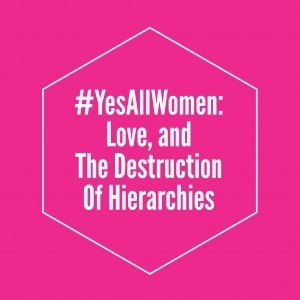 I’ve been thinking today 1 a lot about the trending hashtag #YesAllWomen. If you’re unfamiliar with what’s happening, The New Yorker journalist Sasha Weiss does a great job summing it all up here. Essentially, what’s taking place is that women (and men) from all over the world are standing up against domestic violence and sexual abuse against women. It came about in response to a shooting that took place in Santa Barbara, CA. The shooter, Elliot Rodger, was motivated by a highly violent ideology against women. His numerous youtube videos and “manifesto” writings resembled the highly disturbing remarks of an angry, lonely, mad-man.
I’ve been thinking today 1 a lot about the trending hashtag #YesAllWomen. If you’re unfamiliar with what’s happening, The New Yorker journalist Sasha Weiss does a great job summing it all up here. Essentially, what’s taking place is that women (and men) from all over the world are standing up against domestic violence and sexual abuse against women. It came about in response to a shooting that took place in Santa Barbara, CA. The shooter, Elliot Rodger, was motivated by a highly violent ideology against women. His numerous youtube videos and “manifesto” writings resembled the highly disturbing remarks of an angry, lonely, mad-man.
The reaction to all of this has resulted in a (necessary) finger point back at our culture. Some of the Tweets being shared are shocking, eye-opening, and humbling (especially as a man). The stories from women about domestic violence and sexual abuse are startling. It’s a fact that I believe we need to wake up to. Our culture is filled with sexism, domestic violence, and sexual abuse. Don’t believe me? Go to youtube and watch any video that has a woman in it. Read the comments. You’ll know what I mean. It’s not okay.
Our society degrades women. From a Christian perspective, the church is the worst of all. I’ve written before on how Biblicalism is destroying the perception of Christianity in the world today. We’ve taken the bible so literally, ignoring the cultural differences between today and 2,000 years ago, thereby using the bible to justify sexism, hatred, and violence. We’ve taken a handful of statements from Paul on why “women can’t teach in church” or “have authority over a man” and we’ve used them as weaponry to degrade women.
Let’s be perfectly clear. The bible does not promote the subordination of women to men. Women are not lesser than men. They are to be valued, respected, and treated fairly. I believe that Jesus was in many ways a radical “feminist”. He clearly stood up for women and treated them as equals to men. 2 That’s where I hope we’re headed, but if we keep holding onto to silly arguments like “the bible says so” we may never get there. Church, wake up. Please.
While I was doing some research about this issue, I went on Facebook which is never usually a good idea for productivity, but this time it worked out alright. A page I follow had shared a quote by Karl Barth. It’s dense, so you may need to read it a few times (I did), but here Karl Barth expresses beautifully what love is in the face of injustice:
Love is that denial and demolition of the existing order which no revolt can bring about. In this lies the strange novelty of love. In the cycle of evil unto evil, of reaction unto revolution, it plays no part. Love is the inversion of all concrete happening, because it is the recognition of the pre-supposition that lies in every concrete event. Love, because it sets up no idol, is the demolition of every idol. Love is the destruction of everything that is–like God: the end of all hierarchies and authorities and intermediaries [. . .]. 3
That last statement took me a while to understand, but here’s what I think Barth is getting at. Within the Trinity, the relationship of Father, Son, and Spirit, there are no hierarchies. There is no authority of one over another, neither is there any intermediary between Persons of the Trinity. The Father is not dominating over the Son, nor does the Son require an intermediary between Him and His Father. There is no division, and there is no subordination or domination. There is relationship, trust, love, commitment, service, and other-centered love.
What I think Barth is trying to say here is that love, like God, by nature removes barriers, and tears down hierarchies because love is in itself the end of hierarchies. Love, therefore, is the great agent for social justice because love demolishes the notions of “us against them” or “greater than thou”.
In this context, love means giving up all notions of women being less than men.
I can’t speak for everybody, but having grown up in church I know first hand that #YesAllWomen is not just about what happens outside the church. Maybe it takes a different form, but it’s still there. Prejudice happens within the Church, perhaps sometimes more than anywhere else. That’s not okay for me. Domestic violence, sexual abuse, and blatant sexism is just as prevalent in the church today as it is outside of the church. We can’t be ignorant of this fact.
If we are to suggest a way forward I would suggest the following: 1) Be aware. Read tweets, hear stories, and learn what’s happening. Maybe we can do something about this. 2) Maybe you’ve never been involved in domestic violence or sexual abuse, but actions like that don’t start by random. They begin as thoughts, as jokes, and as an overall perception about women. Learn to think differently about the world around you. 3) Church, let’s get on the right side of history here. Let’s drop the biblicalism and let’s stand up for freedom and justice. Women are not subjective to men, let’s cut the crap.
#YesAllWomen
What are your thoughts? Leave me a comment below!
Like this article? Help me expand my reach by sharing:
Notes:
I actually wrote this last week, but I was afraid to post it. But I’ve realized that not enough is begin said about #YesAllWomen, especially amongst Christians. I thereby feel a responsibility to say something. ↩Here’s a great article on this: 7 Reasons Why Jesus Would Have Been a Proud Feminist. ↩Karl Barth, Epistle to the Romans (1922), 496. ↩May 31, 2014
10 Reasons the Rapture Should Be “Left Behind”
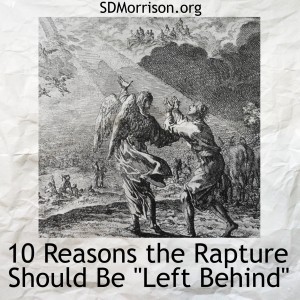 This article is in many ways an apology. Yesterday I published a short bit entitled Nicolas Cage, Left Behind, and Why I Want To Vomit. Admittedly, this post was rash and off the cuff. It came fresh from watching a video for the new Left Behind movie, which seeing my theological position on the rapture, led me to feel frustrated with the whole rapture theory itself. So I wrote a some what offensive and arrogant article to express my opinion.
This article is in many ways an apology. Yesterday I published a short bit entitled Nicolas Cage, Left Behind, and Why I Want To Vomit. Admittedly, this post was rash and off the cuff. It came fresh from watching a video for the new Left Behind movie, which seeing my theological position on the rapture, led me to feel frustrated with the whole rapture theory itself. So I wrote a some what offensive and arrogant article to express my opinion.
I do want to apologize for that. I still stand by what I’ve written, I still think the rapture is a bad idea, but I should have been more factual in my assessment. Therefore, I feel like this article should help see more of the why behind the frustration that you can see in the last post. Yes, I think the rapture is rubbish. Yes, I was probably to harsh. Today I want to present a stronger point by point reasoning as to why I think the rapture should be “Left Behind.”
#1 Scripturally Shaky
A majority of the response was essentially “just read the bible, the rapture is obviously there”. I’ve written before on why that argument is at best circular and at worst nonsensical, but I’ll still respond here. I don’t think it’s logical to equate “my interpretation of the bible”, with all your presupposed person perceptions, cultural differences, and upbringing, with the truth. You may think you can understand the bible so simply, but that would be to ignore the massive cultural, historical, and linguistic differences from today and 2,000 years ago.
It is not scripturally “obvious” that the bible teaches the rapture. It is something that we have injected into the scriptures themselves. There are only a small handful of verse that are typically used to back up the rapture, and most of them are obscure or out of context. Rather than going into the details, let me just say this: If the rapture were true, and if it really is so prevalent in the bible, then why must rapture teachers use such obscure verses? Why wouldn’t it be so obvious in the scriptures? If the rapture is such an important doctrine (which many have told me it is), then why isn’t the bible filled with it? Scripturally, any arguments for the rapture theory are shaky at best. So let’s clear that out of the way. The bible does not “clearly” teach the rapture.
#2 Historically Absent
I’ve said before that the rapture is an invention of the 19th century by a man named John Darby. The earliest mention of this doctrine was in 1830. It then gained a following through the Scofield Bible. In recent times, it has gained a most general acceptance through the Left Behind series. Before all of this, the rapture was literally non-existent in church history. If it’s such an “obvious” of important doctrine, why for 1800 years did no one see it in the bible?
One commenter said that in the writings of a 4th century theologian by the name of Ephraem the Syrian, the rapture is mentioned. If this is true, then it would mean that the rapture is older than the 19th century. I looked into this and I found that this was a shaky lead at best. There’s much debate over the translation of the passage that rapture theorist like to point out as proof that the rapture was taught before John Darby. Here is a good article on why this can’t be taken seriously as any proof that the rapture was ever taught before 1830. But besides, it really wouldn’t matter. Even if he did teach the rapture, obviously no one took him seriously. That would still remain the only reference in history that even hints towards a rapture theory earlier then 1830. Beyond his shaky statement which has caused much controversy, there is no historical evidence that points to a rapture theory ever existing up until 1830.
#3 Fear
The rapture is a bad idea because it is a doctrine that always induces fear. It is often employed by fundamentalists to scare people into the kingdom of God. Think about the (non) logic of that for a moment. We use fear (the opposite of love) to get people into the kingdom of God (of His love)? Aren’t fear and love enemies? Doesn’t “perfect love cast out all fear”? 1 Wouldn’t using fear to get love be a really bad idea?
As I was reading through the comments on the Left Behind movie trailer, I kept reading this: “I hope people watch this movie, repent, and turn to God!” I don’t know how anyone thinks that’s a good idea. Now, I’m sure it’s happened before, just as I’ve seen people become Christians in order to escape hell. But that’s the problem, both don’t last. Very few believers stay Christians after getting scared into doing so. Any relationship that starts with fear is not going to last long!
#4 Rapture Fruit
Let’s think through the impact the rapture has had on our culture today. We have on one hand the prediction folks who love to guess at the time of Jesus’ return, and on the other hand we have the “borderline-cult” groups who wait in isolation for the return of Christ. Both are extremes, but both are also strangely popular in Christianity. Those who predict apocalyptic events usually sell lots and lots of book. (See Blood Moons.) Those who build cult-like societies and isolate themselves from the rest of the world do pretty well, too. They run conferences, they have training schools, and they expand their mission rapidly. If you take a look at the last two hundred years of Christians believing this theory, you can easily find hundreds of cases of both. The fruit of the rapture is usually bad theology, poor stewardship, or blatant manipulation. Which is not to say that all who believe in the rapture are like that, but it is to say something. The rapture messes with people’s well being. (I know it did mine, back when I thought it was true!)
#5 Rapture Jesus is Angry
The rapture turns Jesus into a monster. In it’s high use of apocalyptic language, the rapture theory tends to make Jesus angry, judgmental, and out for blood. In other words, the rapture makes Jesus act very… un-Jesus-like. The rapture takes the fact that Jesus is the Word of God to mankind, and therefore is the truth about who God is, and it takes a big dump on it. Jesus may have been nice while He was on the earth, but when He comes back, He is going to be pissed. Jesus the savior of the world, turns into the Jesus the destroyer of the world. The rapture makes Jesus angry, thereby injecting pagan notions into the Godhead. Which I believe is an awful idea. The same Jesus that laid down His life for the world is going to be the same Jesus who comes again. He isn’t going to come once in forgiveness only to come again in fury. Jesus is Jesus. He doesn’t change. The rapture is a bad idea because it implies that He does.
#6 Literalism (Bad Hermeneutics)
A great Karl Barth quote I’ve always liked goes something like this: “I take the bible too seriously, to read it literally.” The rapture theory practices really poor hermeneutics by reading the bible as a strict literal document. They take texts out of revelation, or from the words of Jesus, ignoring the cultural differences between now and 2000 years ago, and proceeds to read the bible literally. It is a great error to read the bible 2,000 years divorced from culture, history, and language. It is an even greater error to think that this is an effective way to get truth. You cannot look at the bible and read it so literally without making a lot of exceptions or errors in your thinking. The bible is filled with different types of writing styles, as well as vastly different cultural distinctions. Rapture theorists often ignore these and just go strait for the “I read the bible in english and take it literally” approach.
#7 Takes the Bible Literally (Except For Matthew 24)
Rapture theorists are literal right up until they don’t want to be. They take the bible literally when it works in their favor, but figuratively when it does not. The easiest example is in Matthew 24. Here Jesus makes two clear statements that if you were to take literally would destroy the whole rapture theory. Therefore, rapture theorist choose to drop their literalism for the sake of upholding their positions. In Matthew 24 Jesus states very clearly that 1) this generation will not pass away before these things happen (these signs which are often said to accompany the rapture. For example, blood moons.), and 2) that these things will all take place regionally, not globally. These statements are found in verses 34 and 16, respectively. Go and read them for yourselves. If taken literally, they tear apart the whole rapture theory. But that’s the problem, rapture theorists only prefer a literal interpretations of the bible when it suits their interests.
#8 Promotes Escapist Theology
One of the worst effects of the rapture theory is the continual “escape this world” mentality. The rapture theory is therefore highly Gnostic and Dualist in thought. The rapture makes this world evil, and some “other” “spiritual” world good (just as the Gnostics did). According to the rapture theory, we must then escape this present world and head off into that “good” world. This is the same way of thinking that was prevalent in early Gnosticism (an first century church heresy). The result is similar today as it was then. We have taught behavior modification, and self mutilation as a means to escaping this world. (How many times have you heard it said to “deny yourself”?) This is similar to Gnostics who taught earthly disciplines in order to gain spiritual rewards. There’s nothing wrong with discipleship and humility, but within the right context. We are not to escape our humanity or to escape our world. We are to embrace our humanity and our world. The Rapture teaches a high form a Gnosticism by teaching the church to wait for some mystical, secret escape from this earth, rather than living here and making this world a better place.
#9 Flips the Mission of Jesus Upside-Down
In return, escapism leads to a neglect of the mission of Jesus on this earth. We are called not to escape out of this world into heaven, we are called to make this world look like heaven. “Let you kingdom come, on earth as it is in heaven…” Jesus did not want us to merely escape our world, He wanted us to invade our world with His reality. We are to manifest the Kingdom of God here and now to all those around us. We are not to escape to some mystical Kingdom, the Kingdom is here. It has arrived! We reveal it to the world around us. The rapture flips the whole mission of Jesus on it’s head. When we only believe that the world must get worse before Jesus returns, then we give up hope for the world. Giving up hope a dangerous. Rapture theory teaches a hopeless perspective of the future, and an upside-down mission of Jesus. We are not told to escape to heaven, we are told to bring heaven to earth.
#10 Jesus is Coming Again, Once
The rapture makes the return of Christ a second and third return. The rapture implies that Christ will come once to “magically” cause all the Christians to disappear, and then again to judge the earth. In doing so, the Rapture implies a second and a third coming of Christ. This is not only absent from the scriptures, but is warned against. When Jesus comes it will be public, it will be quick, and it will not be done in secret. All of the verse that Rapture theorists use to “prove” the rapture, imply a public return of Christ not a private one. For example, a big one for rapture theorists is 1 Thessalonians 4:13-18. Verse 16 implies a clear indication that Christ’s return will be public, not private. The return of Christ will not be a random disappearance done in secret, it will be a display for all to see. Jesus does not have a second and a third coming. Jesus is coming again, once.
Conclusions
 If you’re still reading, I’m glad you stuck with me. I think this is the longest post I’ve written here. I hope that these points are more than enough to convince you that the rapture is a bad idea. (Or at the very least I hope you’ve begun to question your belief.) We should leave it behind in our theology immediately. In review, the rapture is a bad idea because… 1) it is unbiblical, 2) the church has never held it historically, 3) it creates fear, 4) the bad fruit is right there in history, 5) it changes Jesus into a monster, 6) bad hermeneutics, 7) inconsistent hermeneutics, 8) it promotes escapism, 9) it changes the mission of Jesus, and 10) it implies a third coming of Christ.
If you’re still reading, I’m glad you stuck with me. I think this is the longest post I’ve written here. I hope that these points are more than enough to convince you that the rapture is a bad idea. (Or at the very least I hope you’ve begun to question your belief.) We should leave it behind in our theology immediately. In review, the rapture is a bad idea because… 1) it is unbiblical, 2) the church has never held it historically, 3) it creates fear, 4) the bad fruit is right there in history, 5) it changes Jesus into a monster, 6) bad hermeneutics, 7) inconsistent hermeneutics, 8) it promotes escapism, 9) it changes the mission of Jesus, and 10) it implies a third coming of Christ.
If all that’s not enough to convince you to leave the rapture behind, then I don’t know what will.
After reading this article, do you feel like your view of the rapture has changed? Why or why not? Leave me your thoughts in the comments section below!
Like this article? Help me expand my reach by sharing:
Resources: I recommend these two sources for anyone who’s interested in studying this further. First, Greg Boyd’s video teaching on Youtube about the book of Revelation. Second, the book Victorious Eschatology by Harold Eberle and Martin Trench.
Notes:
1 John 4:18 ↩Nicolas Cage, Left Behind, and Why I Want to Vomit
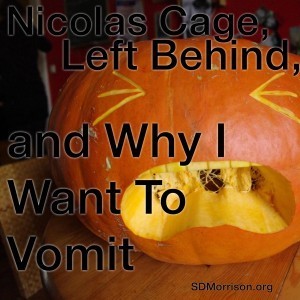 I think I’m going to be sick.
I think I’m going to be sick.
I was on Facebook today when all of a sudden I found myself watching one the most disturbing videos I’ve seen in a long time. I cringed, I cried out “oh no!”, and I just about threw up (well, not really, but I wanted to).
I watched a trailer for the new Left Behind movie staring Nicolas Cage (Wait, really?). Watch it here.
The Left Behind series presents, in my mind, one of the absolutely worst inventions of the 19th century in story form: the rapture. 1
I still find it ridiculous that anyone would believe that the rapture is a real event that will eventually take place. From a biblical standpoint, it’s wholly nonsensical and has no evidence beyond out-of-context bible verses that “might” mean something like a rapture. 2 Yet thousands of Christians willingly believe in this, and hope that one day the rapture will actually happen.
I know firsthand because I was one of them. Growing up I was terrified of the rapture. I was terrified that I might be “left behind” one day.
It was a freeing experience as soon as I realized that the rapture is not real. In fact, I learned that the rapture was completely made up in the 19th century. You won’t find a single reference to the rapture before that time. No one in history believed in the rapture up until that time. No reformer, no medieval theologian; no early church father believed in it.
So why in the world do we believe it today?
I believe it has a lot to do with this movie. The Left Behind series made popular the rapture theory, thereby establishing the illusion that this is truth. Since most believers don’t read the bible or study theology for themselves, they gave into what appeared to be a sensational perspective for the end times.
In a literal sense then, we have injected a hollywood doomsday obsession into the bible. We love this stuff because it’s so sensational and exciting. The Left Behind series isn’t popular because it’s good theology, it’s popular because it’s a mixture of excitement, hollywood pizzazz, and biblical literalism. Essentially, Left Behind makes the bible interesting to a generation that’s no longer interested. We’ve traded a love affair with the Gospel for a love affair with the rapture, the return of Christ, and the apocalyptic imagery of Revelation.
We’ve become eschatologically obsessed.
Don’t believe me? Go look at Amazon’s best seller list for Christian books. I guarantee you that in the top 5 there will be at least a book about the rapture, a book about heaven, or a book about hell (or a mixture of all three). 3
The rapture is just a bad idea, and so is promoting it in hollywood. Do you know how much fear something like that induces? Especially if you believe it’s not just a fictional story? I was scarred as a child imagining all the horrific events that were taught to me as fact, instead of theory. 4
We need to get honest with ourselves and stop promoting this garbage theology. The rapture is not real. Let’s get past this eschatological obsession so that we can be the hands and feet of Jesus to this world. Let’s take care of our world, not look to escape it.
What do you think? Am I fair in saying that we’re an eschatologically obsessed church? Do you remember the old Left Behind films? Let me a comment below!
Like this article? Help me expand my reach by sharing:
For anyone in need of an explanation as to why I think the rapture is a bad idea, see this article.
Notes:
I’ve written before about the rapture. ↩Greg Boyd on the rapture. ↩Popular books recently: The Four Blood Moons, and Heaven is For Real ↩The rapture is just a theory, remember? And it’s a bad one. ↩May 28, 2014
My Shadow Days Are Over: Rethinking Total Depravity
 Are people good? Or are people bad?
Are people good? Or are people bad?
It seems like a simple question until you get into it. Christian Theology often talks about “original sin” and “total depravity” in regards to what took place after the fall of Adam in Eden. We say that since Adam fell in the garden, the human race fell into sin and evil.
Growing up in a Christian church my whole life I was a borderline fundamentalist at times, and therefore I wouldn’t have seconded guessed this question for a minute. I would have said right away that humanity is bad.
There’s no question as to whether mankind can do bad things, but it’s more about asking ourselves: are we really inherently evil?
Theologically, there are different positions on this. Total depravity is one of the five points of calvinism. Total depravity is also held in Arminian theology, but to a lesser degree then calvinism. Depending on who you ask definitions of this term will differ.
Some will say that because mankind is totally depraved, we desire that which is evil over that which is good. Therefore, total depravity is a pull towards evil, and a rejection of good. (i.e. the in ability to choose God, in Calvinism)
Within this definition, while there may be good acts, fundamentally human beings are evil and sinful to their core. There is nothing good in them, although they try and cover up their sin with good works.
I think the best argument I’ve read against this notion of total depravity comes from St. Paul in Romans 7. I was reading through Romans 7 one day trying to figure out who Paul is talking about (his present self vs. his former self), when it dawned on me that if he is talking about his former self, he is also making a clear case against total depravity.
Romans 7 essentially is where Paul makes statements about himself as someone who desires to do good, but remains unable to do good. This chapter is often used to talk about how Christians have a dual nature, that of sinner and saint, but as I’ve written here and here I don’t think a Christian has two natures.
Therefore, this leaves us with the conclusion that Paul is talking about his former way of life. So when we read statements like this, we need to rethink some things: “For I have the desire to do what is right, but not the ability to carry it out. For I do not do the good I want, but the evil I do not want is what I keep on doing.” 1
If this is a pre-Christ Paul, then total depravity is not as we once thought. Mankind is still good, desiring good things, yet unable under the law to perform them.
I do believe that sin has corrupted our nature, but I don’t think sin has ruined our nature. I’ve been rethinking the doctrine of total depravity lately, and so that’s where all this is coming from. I’m not trying to say that total depravity is wrong, but perhaps it’s not as true as we once thought?
Much of this started for me when I read an interesting statement about how Eastern Orthodoxy understands total depravity. Check it out:
The Orthodox tradition, without minimizing the effects of the fall, does not however believe that it resulted in a ‘total depravity’… The divine image in man was obscured but not obliterated. His free choice has been restricted in its exercise but not destroyed. Even in a fallen world man is still capable of generous self-sacrifice and loving compassion. Even in a fallen world man still retains some knowledge of God and can enter by grace into communion with him.
…The doctrine of original sin means rather that we are born into an environment where it is easy to do evil and hard to do good; easy to hurt others, and hard to heal their wounds; easy to arouse men’s suspicious, and hard to win their trust. 2
So if we go back to our original question, “are people good?” what should we say?
Perhaps the world isn’t evil?
Perhaps mankind really is good? Maybe we aren’t able to act on our goodness without the empowerment of grace?
I was thinking about all of this while walking home from work on day listen to John Mayer (which happens often). All of a sudden his song “Shadow Days” came on. It’s not my favorite song from John, but the chorus felt like a smack in the face from on High. It’s a challenge: are we able to look ourselves in the mirror, and say “I am good”?
Here are the chorus lyrics:
I’m a good man with a good heart
Had a tough time, got a rough start
But I finally learned to let it go
Now I’m right here, and I’m right now
And I’m open, knowing somehow
That my shadow days are over
My shadow days are over now
When you see yourself, can you see yourself as someone who is good?
I think it is important to. “I’m a good man with a good heart…”
When you see another human being, can you say that they are good? Even when they do bad things?
Can we see the goodness of God in all people, including ourselves?
It’s something I’ve been challenging myself with lately.
What do you think about “total depravity”? Am I on to something here? Leave me a comment below!
Like this article? Help me expand my reach by sharing:
Notes:
Romans 7:19 ESV ↩Met. Kallistos Ware on God as Creator’; The Orthodox Way [p. 62,63] seen here ↩May 26, 2014
“Hate the Sin, Love the Sinner” – Disgrace to Grace #5
 It’s been a while since I’ve done one of these. You can find the other four here. There’s no order or focus here, that is, except for a series of articles debunking Christian beliefs/dogma that are in fact very un-christian. Here’s number 5:
It’s been a while since I’ve done one of these. You can find the other four here. There’s no order or focus here, that is, except for a series of articles debunking Christian beliefs/dogma that are in fact very un-christian. Here’s number 5:
“Hate the sin, love the sinner.”
In theory, this works. But we can’t live in the theoretical la-la land of what should work. Every now and then we need to get real and face the music. This mantra of ours, is not working.
This phrase is usually used in the context of homosexuality. We talk about “loving” homosexuals while hating their sin.
There’s two thoughts I have about this. To begin with, let’s flip this around and try it on ourselves. I’ll be the guinea pig.
I’m a writer. I align myself with that title, and I’m proud of it. But what if you read something I’ve written, like my book, and you tell me you hated it. My book was an utter abomination to you. It was bad theology, horrible logic, etc, etc.
Now, no matter how much you try to “love me”, I doubt I would want to hear much more from you. It’s hard to separate something you are so passionate about, to the point of wrapping it up with you identity, from yourself. In other words, I take criticism seriously. There is an emotional element involved. I may tell myself to separate myself from my work, but that is really difficult.
Am I my book? No. But I put my heart in soul into my writing, and that makes it really hard to hear “I love you” in the midst of “I hate what you’ve written.”
Now imagine that standing before you now is a homosexual. You may “hate the sin and love the sinner”, but what if for them, that’s the same thing? What if they are their “sin”. It’s not for them just what they do, it’s wrapped up into their DNA. They were born this way!
How deep do you think it hurts? How painful are our words? They may be well-intended and honest, but the sharp reality is that our words can kill.
The fact of the matter remains: we can’t “hate the sin” without hurting the sinner. This is especially true when the sinner identifies themselves with what they do, the very thing you “hate”. They don’t feel your theoretical “love” all they feel is cold, hard hatred.
Do they feel loved?
A good question we should ask ourselves is not “do we love”- because our answer will always be a subjective opinion. We must instead ask: “do these ‘sinners’ feel loved?”
Do you think the people we’re talking about who we supposedly “love” actually feel loved from us? If you asked, would they say so?
That matters, therefore, far more than whether or not you think you love people.
Stop trying to “hate the sin, love the sinner” and just love. Period. No further comment. Just love, as Christ loved: selflessly, radically; genuinely.
Now what do you think? How can we love those we disagree with? Leave me a comment below!
Like this article? Help me expand my reach by sharing:




